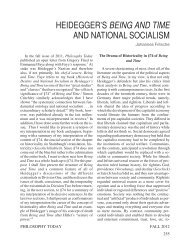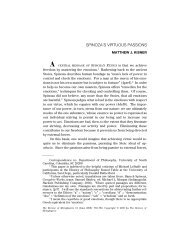The Essay as Self-Knowledge: Montaigne's Philosophical ...
The Essay as Self-Knowledge: Montaigne's Philosophical ...
The Essay as Self-Knowledge: Montaigne's Philosophical ...
Create successful ePaper yourself
Turn your PDF publications into a flip-book with our unique Google optimized e-Paper software.
78 ANN HARTLE<br />
Montaigne is always leading the reader back to himself, back to<br />
his own strangeness. It is man himself, the most familiar, that is most<br />
strange. <strong>Essay</strong> II.8, “Of the affection of fathers for their children,” is<br />
addressed to Madame d’Estissac: “Madame, if strangenesss and novelty,<br />
which customarily give value to things, do not save me, I shall<br />
never get out of this stupid enterprise with honor; but it is so fant<strong>as</strong>tic<br />
and appears so remote from common usage that that may enable<br />
it to p<strong>as</strong>s. . . . Finding myself entirely destitute and void of any other<br />
matter, I presented myself to myself for argument and subject. It is<br />
the only book in the world of its kind, a book with a wild and eccentric<br />
plan. And so there is nothing in this job worth noting but its<br />
bizarreness; for a subject so vain and mean could not have been f<strong>as</strong>hioned<br />
by the best workman in the world into something worthy of<br />
notice” (VS385; F278).<br />
<strong>The</strong> wild and eccentric plan of the <strong>Essay</strong>s is due to the fact that<br />
Montaigne always comes upon himself by accident: “This also happens<br />
to me: that I do not find myself in the place where I look; and I<br />
find myself more by chance encounter than by searching my judgment.”<br />
25 Sometimes he cannot understand what he himself h<strong>as</strong> written<br />
because he forgets what he meant, where<strong>as</strong> a stranger will discover<br />
his meaning. But at other times, “chance will show me the light clearer<br />
than noonday and make me <strong>as</strong>tonished at my hesitation” (VS40; F26-<br />
27). In “Of some verses of Virgil” he writes: “but I am disple<strong>as</strong>ed<br />
with my soul for ordinarily producing its most profound and maddest<br />
fancies, and those I like the best, unexpectedly and when I am<br />
le<strong>as</strong>t looking for them” (VS 876; F668).<br />
<strong>The</strong> order, or rather the apparent disorder, of the essays is meant<br />
to be contr<strong>as</strong>ted with the “rigid method” that, according to P<strong>as</strong>cal,<br />
Montaigne regarded <strong>as</strong> inadequate to his purpose. Specifically, the<br />
essay must be contr<strong>as</strong>ted with the way of deduction carried out in<br />
the syllogism, with the mode of disputation practiced in the schools,<br />
and with the form of the treatise. 26 Montaigne finds more truth in the<br />
chatter of fishwives and more order in the arguments of shop-boys<br />
and shepherds than in the disputations of the logicians. “It is not so<br />
much strength and subtlety that I <strong>as</strong>k for <strong>as</strong> order; the order that we<br />
see everyday in the altercations of shepherds and shop boys, never<br />
among us. If they get off the track, it is by way of incivility; so indeed<br />
do we. But their turbulence and impatience never sidetrack them<br />
from their theme; their argument follows its course. If they get ahead

















